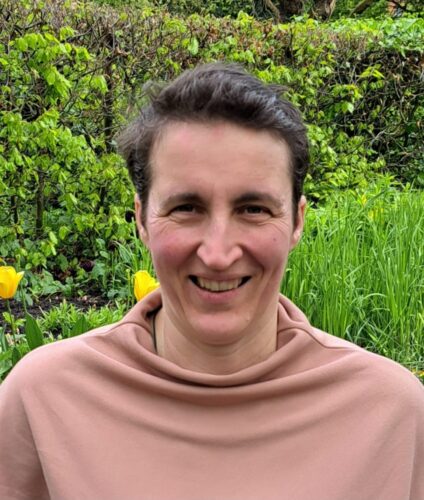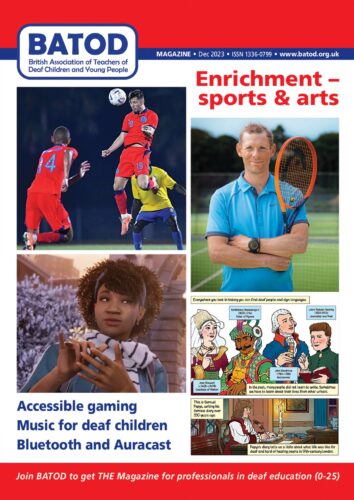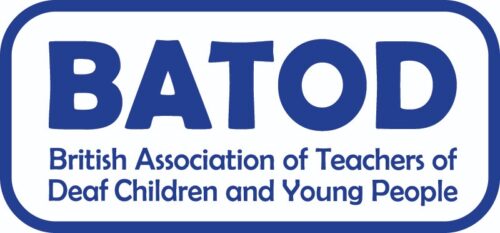This month we got to interview Teresa Quail about the work of BATOD (British Association of Teachers of Deaf Children and Young People), the current state of deaf children’s education, and what the future might hold.
Teresa Quail is a Qualified Teacher of Deaf Children and Young People (QToD), Educational Audiologist and a past Local Authority Head of Specialist Teaching Service. Over the years she has gained experience across the UK, in schools with resource provisions and as a peripatetic QToD supporting deaf children and young people from birth to college. Teresa is now a full time employee with British Association of Teachers of Deaf Children and Young People (BATOD), and works as the National Executive Officer and Magazine Editor. She enjoys the opportunity to work in partnership with deaf and hearing colleagues across many sectors representing BATOD, and to develop sign language knowledge from a range of UK regions and nations.

Can you tell us a little bit more about BATOD – what is you purpose, and what kind of work you do?
BATOD is the only professional association for Qualified Teachers of Deaf Children and Young People (QToDs) in the UK. Although a British association, BATOD also has international members and strong links with partners globally,
BATOD’s purpose is to promote excellence in Deaf education.
The association works to:
- promote the education of all deaf children, young persons and adults.
- advance the status of QToDs.
- ensure and enhance the high quality of mandatory training of QToDs, and their continuing professional development.
The Association supports QToDs and organises continued professional development (CPD) courses and national and regional meetings to provide relevant up-to-date information and to disseminate good practice for all professionals working in deaf education.
Members are continually kept abreast of developments through BATOD produces a quarterly magazine and refereed Journal (Deafness and Education International), regular newsletters to members, the website and social media links
Strong links are maintained between BATOD and the UK governments, as well as voluntary bodies, especially the National Deaf Children’s Society, in order to contribute to policy development in this field and to represent the interests of QToDs and the children and young people they teach.
Can you share a bit about the history of BATOD? For example, why it was set up, and when? The journey to now?
BATOD was formed in 1976 in the name British Association of Teachers of the Deaf, by the amalgamation of The National College of Teachers of the Deaf (NCTD) and the Society of Teachers of the Deaf (STD). In October 2022, BATOD revised the name to British Association of Teachers of Deaf Children and Young People.
Over nearly 50 years, BATOD has promoted the educational interests of all deaf children, young people and adults and has actively sought to advance the profession and safeguarded the interests of QToDs.
The purpose then, as now, was to improve outcomes for deaf children and young people, by ensuring that teachers had the necessary qualifications, knowledge and experience to deliver high quality education. BATOD does this through its support of the mandatory qualification for teachers of the deaf, on-going professional development opportunities and through the provision of on-line resources.
Why is it important to have an organisation like BATOD?
Over 75% of QToDs in the UK are members of BATOD. At least 11% of BATOD QToD members are deaf. This means BATOD has a strong voice to represent the interests of members, in all areas of the UK.
BATOD is able to represent the views of members to government departments and when working with other agencies, to inform and influence policies which will affect the education of deaf children and young people.
BATOD provides a strong voice with central and local governments to safeguard the special educational needs of deaf children, young persons and adults, and with the teacher unions to protect our special professional interests.
BATOD’s membership provides a network for professionals specialising in the field of deaf education as well as space to overcome professional isolation and access information about new developments and with colleagues across the UK, Ireland and internationally.

What do BATOD think about the current state of deaf children’s education? What are the positives and negatives?
Many positives can be identified currently in deaf children’s education:
- UK governments continue to recognise the need for the mandatory qualification for ToDs.
- An increasing number of deaf ToDs are entering the profession, influencing practice through their lived experience.
- Early identification of deafness through newborn screening enables children and families to access support at a very early age. QToDs are able to support children and families in the home and pre-school settings and prepare them for transition to school.
- Language and communication are at the heart of deaf children’s cognitive, emotional, and social development. With an increasing understanding of communication options opposed to one language only philosophy, more deaf CYP and their families, are supported to access BSL
- The rapid developments in technology offer increasing opportunities to deaf CYP – both in terms of assisted listening devices and access to web-based learning activities.
- The Covid-19 pandemic highlighted many challenges that CYP experience on web-based teaching platforms as well as in the classroom environments butt also provided opportunities. The enhancement of accessibility features has provided some CYP across larger geographical areas another way to engage with each other as well as deaf model adults. In some areas this has generated research focus on technology-based development in the classroom with captioning provision.
However, deaf children’s education also faces many challenges:
- The challenging financial climate in schools inevitably impacts on all CYP and particularly those who may require additional support. Lack of funding may result in reduced specialist support and choice for CYP and families, for example in terms of communication support – access to BSL and effective audiological support – and in choice of placement.
- The low incidence nature of deafness provides a constant challenge to ensure those working with deaf CYP understand deafness and how to ensure the CYP can access a broad and balanced curriculum to meet their needs. The creation of the BATOD/NDCS Specialist Deaf Curriculum Framework is one of a number of initiatives designed to support this.
Within this context, BATOD works tirelessly to protect the status of QToDs, the recognition of the particular support needs of deaf CYP and to promote ongoing recruitment of specialist staff, despite budget cuts and the data which suggests a disproportionate number of QToDs are over 50.
The 2023 CRIDE report said that 48% of peripatetic TODs were aged 50 or over and thus are likely to retire in the next 10 to 15 years. What do you think the impact will be? How can we overcome it?
BATOD is a founding member of CRIDE (Consortium for Research into Deaf Education). The CRIDE 2023 UK wide survey reflects “that 48% of TODs were aged 50 and over, and due to retire in the next 10 to 15 years. In 2021 this stood at 50%”.
A QToD is a qualified teacher with the additional mandatory qualification that equips them to work with deaf CYP from birth to young adulthood. QToDs play a crucial role in the lives of deaf babies, CYP and their families by providing advice and support. Across all ages, the premise of an effective QToD role is to share a depth of understanding of the needs of deaf CYP and how to meet them. This specialist support focusses on two key outcomes as a route to social inclusion, ensuring all CYP have fair and optimised access to education and that all CYP have opportunities to develop their own agency, voice and independence. Achieving these outcomes requires inclusive practice such as:
- Family-centred practice
- Partnership working with educational professionals
- Multi-agency working with partners in health, social care and third sector organisations.
- Direct teaching
BATOD is committed to safeguarding the QToD profession. The association has consistently worked with UK governments to ensure that as QToDs retire, they are replaced. If sufficient numbers of QToD are not maintained, this will have a negative impact on deaf CYP and their families – on their education, social inclusion and health and well-being.
BATOD works with the UK governments in relation to the mandatory qualification. BATOD has been a member of the Trailblazer working group for the potential Apprenticeship Level 7 route for training QToDs in (England).
BATOD promotes the bursary options available via some of the mandatory qualification course providers (currently only available in some of the England universities).
BATOD advocates the provision of bursaries in discussions with governments, unions and other associations across the UK.
BATOD, on behalf of the Ovingdean Hall Foundation, administers the Con Powell Scholarship to provide bursaries for teachers wishing to train as a QToDs.


